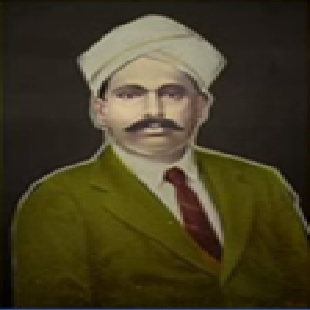
T.P. Krishnasamy Pavalar was born on 29 August, 1980 in Chintadripet, Madras. Pavalar was a brilliant Tamil scholar. He had the unique capacity of composing a poem at the drop of a hat on any subject suggested to him. He dedicated his life to the cause of Tamil and the fight for freedom. During his time many patriots burned imported clothes and swore to wear only handspun khadi. Based on this movement, Pavalar wrote the play Kadharin Vetri. It was staged in 1922 and proved a major success in all the Tamil-speaking parts of the Madras Presidency. In 1923, a Tamil play, Kadharin Vetri (Khadi’s success), was staged at the Wembley World Fair in London. Rather surprisingly, it was a play that highlighted the Indian freedom movement which was then gathering strength under the leadership of Mahatma Gandhi. The person who left his footprint in London was a Tamil playwright, ardent patriot, and journalist, one of the founding fathers of Modern Tamil Theatre, T. P. Krishna-swami Pavalar. Palavar had his own drama troupe, Bala Manohara Sabha. It staged the hit play at the famous Royal Theatre. Expectedly, the British Indian Government banned Kadharin Vetri, but, undaunted, Pavalar, who had considerable influence with the British official's thanks to his involvement with the Boy Scouts Movement, approached the then Governor, Lord Willingdon, with whom he was on friendly terms. He persuaded Willingdon to withdraw the ban order just before the plush curtain went up at Royal Theatre on opening day. From Royal Theatre in Madras to faraway Wembley (Stadium) in England, it was a success-drenched journey for Pavalar. Socially conscious as he was, he wrote another play dealing with the problems of drinking, gambling, visiting women of questionable morals, and how it impacted marital life. It was called Pathi Bhakti and was produced by the Madurai Original Boys’ Company, one of the most famous drama troupes of the day. The play proved a great success. It was later filmed in 1936. Another play by Pavalar was Bombai Mail. The title was not the name of a train but the name of the hero who worked for the upliftment of the poor, oppressed, and depressed, and indulged in robbery to help the downtrodden. It was obviously inspired by Robin Hood. In Pavalar’s play, in the opening sequence, the hero jumps onto the stage carrying the Congress tricolor singing ‘Jai! Jai! Jai! Bharatha Manikodi Vaazhga’. The hero sang many songs highlighting Mahatma Gan¬dhi’s charka, Hindu-Muslim unity, and other such national themes. This play was filmed more than once. Another play was Punjab Kesari (Lion of Punjab), in which the hero is mostly masked. Staged in 1938, it featured the well-known stage and screen actor of his day P. Kesavan had played the lead role in Bombay Mail too. Pavalar was also a journalist and he launched a Tamil magazine, Desabandhu, and a Tamil daily 64 Kaalanaa Indraiya Samacharam (Today’s News), which was sold for kaalanna (a quarter of an anna). During that period, businessmen were shy about advertising in Tamil publications but one young man who succeeded in getting advertisements for Pavalar’s publications was an aspiring journalist himself who would later create history as S.S. Vasan. Pavalar passed away on 1 March 1934. It is a matter of regret that today not many are aware of Krishnaswami Pavalar’s contribution to the Tamil language and the Indian freedom movement.
Source : Indian Culture Portal